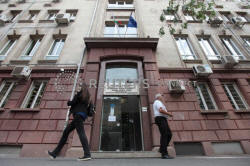'Wizard' cybersecurity expert charged with record hack of Bulgarian tax
agency
 Send a link to a friend
Send a link to a friend
 [July 17, 2019] By
Tsvetelia Tsolova and Angel Krasimirov [July 17, 2019] By
Tsvetelia Tsolova and Angel Krasimirov
SOFIA (Reuters) - A 20-year-old Bulgarian
cybersecurity worker has been arrested on suspicion of involvement in a
hacking attack that stole millions of taxpayers' personal and financial
data, officials said on Wednesday.
Bulgaria's NRA tax agency is facing a fine of up to 20 million euros
($22.43 million) over the data breach, the biggest to affect the Balkan
country, which was revealed this week. The cyber attack is thought to
have compromised the records of nearly every adult among Bulgaria's 7
million people.
Yavor Kolev, head of the police's cybersecurity unit, said the
unidentified man was arrested on Tuesday afternoon. Officers raided his
home and office in the capital Sofia and seized computer devices
containing encrypted data.
"Overnight, the relevant examination was carried out, a very initial
one, which suggests that the suspect is connected to the crime," Kolev
said.

The investigation into the hack is still at an early stage, he added,
and police are looking into the possibility that other people were
involved.
Sofia city prosecutors said the 20-year-old man had been charged with a
computer crime and would be held for another three days.
The attack has reignited a long-running debate about lax cybersecurity
standards in Bulgaria. A person claiming to be a Russian hacker and
responsible for the breach emailed local media on Monday and denounced
the government's cybersecurity efforts as a "parody".
Kolev said the arrested man was a researcher who tested computer
networks for possible vulnerabilities to prevent cyber attacks. But he
had also engaged in some criminal activity, Kolev added: "In his life,
he has been on both sides."
'UNIQUE BRAINS'
Speaking at a government meeting on Wednesday, Prime Minister Boyko
Borissov described the arrested man as a "wizard" hacker and said the
country should hire similar "unique brains" to work for the state rather
than against it.
But some experts who have examined the stolen data said the techniques
used in the attack were relatively basic and spoke more to a lack of
adequate data protection measures than the hacker's ability.
[to top of second column] |

People walk outside Bulgaria's National Revenue Agency building in
Sofia, Bulgaria, July 16, 2019. REUTERS/Dimitar Kyosemarliev

"The reason for the success of the attack does not seem to be the sophistication
of the hacker, but rather poor security practices at the NRA," said Bozhidar
Bozhanov, chief executive at cybersecurity firm LogSentinel.
Bulgaria's tax agency now faces a fine of up to 20 million euros, or 4% of its
annual turnover over the data breach, said Veselin Tselkov, a board member at
the Commission for Personal Data Protection.
"The amount of the sanction depends on the number of people affected and the
volume of leaked information," he told Reuters, adding that the commission was
still waiting for full report on the attack.
Bulgaria's leading business organization BIA, which warned about possible flaws
in the tax agency's data protection system a year ago, demanded that detailed
information for the leaked documents be sent to every person and company
affected.
"We need to know so that at least we can be aware of possible dangers," said BIA
deputy head Stanislav Popdonchev.
Bulgaria's finance minister Vladislav Goranov has apologized for the attack,
which exposed the names of millions of people and companies and revealed
information about incomes, tax declarations, health insurance payments and
loans.
The hack happened at the end of June and compromised about 3% of the tax
agency's database. Officials said earlier this week initial signs suggested it
was conducted from abroad.
(Reporting by Tsvetelia Tsolova; Editing by Jack Stubbs and Catherine Evans)
[© 2019 Thomson Reuters. All rights
reserved.] Copyright 2019 Reuters. All rights reserved. This material may not be published,
broadcast, rewritten or redistributed.
Thompson Reuters is solely responsible for this content.
 |